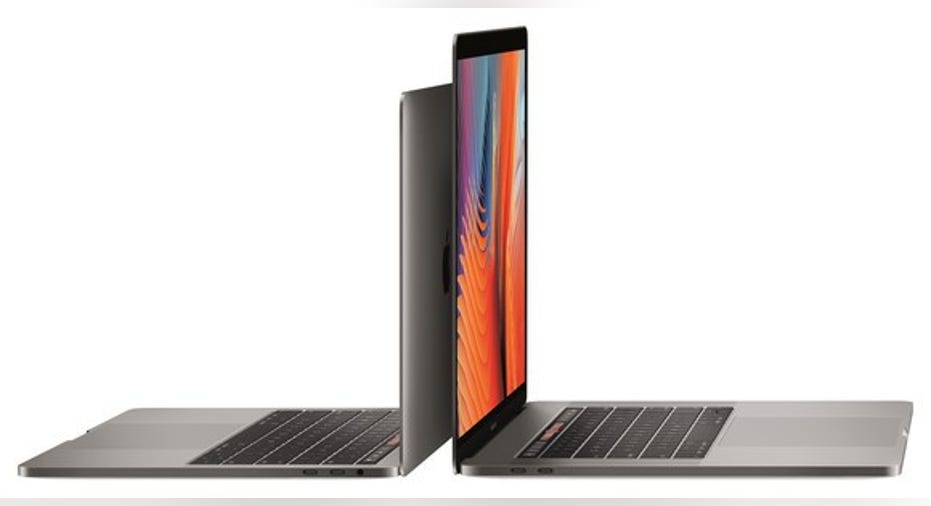Here's Why Apple Inc. Waited So Long to Release New MacBook Pro Computers

Apple's (NASDAQ: AAPL) 2015 MacBook Pro refresh principally consisted of bringing slightly faster processors, modestly larger batteries, and Force Touch track pads to the prior-generation models. Late last month, Apple released new MacBook Pro models that represented much larger leaps forward than what last year's models did.
Image source: Apple.
The changes that Apple brought to this year's models were sweeping. Among them were sleeker form factors, much better displays, speedier processors, a new Touch Bar with Touch ID support in place of the function keys, new keyboards, and improved Force Touch track pads.
The investment community might be wondering why it took Apple so long to get these redesigned MacBook Pro systems out. Per a new report from DigiTimes, we now have the answer.
Blame manufacturing yields on some components
DigiTimes, citing "sources from the upstream supply chain," says that Apple is "said to have delayed the product's shipment schedule by a quarter due to low yield rates for some components."The components facing these yield challenges, the report says, included batteries, keyboards, and hinges.
Component manufacturing yield issues can lead to both supply issues (not enough good product gets made) as well as cost-structure problems (defective products have a non-zero cost to manufacture but ultimately generate no revenue, raising the average cost for the ones that ultimately are salable).
It's little wonder that Apple decided to hold off on bringing these new systems to market until yields on these critical components improved.
Apple reportedly "placing aggressive orders" for new MacBook Pro components
Although the DigiTimes report offered an explanation for the delay in bringing these new MacBook Pro computers to market, the article was primarily focused on Apple's component order patterns for the systems. This is interesting stuff, so let's take a closer look at what it had to say.
Per DigiTimes' sources, Apple is "optimistic about the sales" of these new MacBook Pro computers. That optimism, DigiTimes reports, has led to Apple "turning aggressive" with respect to component orders "after the launch in October."
Furthermore, those same sources reportedly told DigiTimes that "MacBook Pro shipments in 2017 are also expected to stay at the same level as in 2016."
According to market research company IDC, the personal computer market is expected to decline by 7.2% in 2016. During the first three quarters of the year, Apple's personal computer unit declines have been wider than those that the overall personal computer market have suffered; this means that Apple has been losing market share.
| Metric |
Q1 2016 |
Q2 2016 |
Q3 2016 |
|---|---|---|---|
|
Apple Mac unit shipment growth |
(12%) |
(11%) |
(14%) |
|
PC market unit shipment growth |
(11.5%) |
(4.5%) |
(3.9%) |
Data sources: Apple, IDC.
Should the personal computer market decline again in 2017, Apple simply shipping the same number of MacBook Pro computers in 2017 as it does in 2016 would imply a return to market share gains.
The revenue growth story could be more interesting than the unit shipment story
Apple returning to year-over-year unit share gains in the personal computer market would be a positive, but the real story here could be the potential for growth in revenue share.
Remember, Apple's new MacBook Pro products are priced at premiums to what the prior-generation models were priced at. Furthermore, Apple is keeping some of its prior-generation models around at the same price points that they were at before the new MacBook Pro systems launched.
If Apple is able to keep its MacBook Pro unit shipments flat in 2017 relative to what they were during 2016, it is likely that its average selling prices on those systems will be significantly higher. This could lead to Apple's Mac-related revenue growth (and thus revenue share growth) being much more robust than its unit (and unit share) growth will be.
A secret billion-dollar stock opportunity The world's biggest tech company forgot to show you something, but a few Wall Street analysts and the Fool didn't miss a beat: There's a small company that's powering their brand-new gadgets and the coming revolution in technology. And we think its stock price has nearly unlimited room to run for early in-the-know investors! To be one of them, just click here.
Ashraf Eassa has no position in any stocks mentioned. The Motley Fool owns shares of and recommends Apple. The Motley Fool has the following options: long January 2018 $90 calls on Apple and short January 2018 $95 calls on Apple. Try any of our Foolish newsletter services free for 30 days. We Fools may not all hold the same opinions, but we all believe that considering a diverse range of insights makes us better investors. The Motley Fool has a disclosure policy.



















